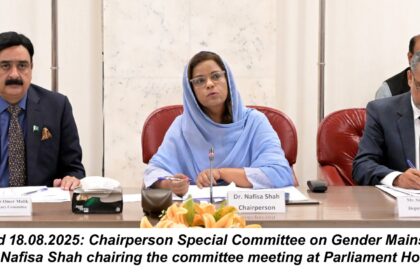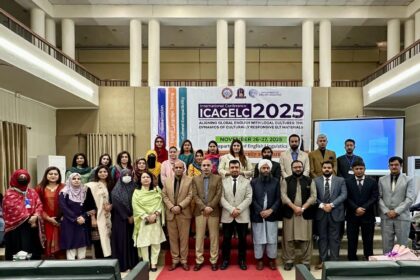A two-day national consultation on a gender parity report opened in Islamabad with participants agreeing on the urgent need to harmonize and standardize Pakistan’s gender data so the country’s progress is accurately reflected in global reporting. The first day brought together government bodies, international partners, data providers and provincial representatives who identified gaps in current data systems and committed to building a more consistent, timely and comparable framework.
The National Commission on the Status of Women hosted the consultation in collaboration with UN Women Pakistan, UNFPA Pakistan, the Embassy of the Netherlands and Group Development Pakistan. The meeting aimed to examine how federal and provincial data frameworks can be aligned to produce a clear national picture of gender equality and women’s status.
Ume-Laila Azhar, Chairperson of the National Commission on the Status of Women, presented a comparative analysis of provincial frameworks. She warned that differing indicators and measurement approaches between federal and provincial levels produce an incomplete picture, which obscures Pakistan’s achievements and challenges from global audiences and rankings.
Former NCSW Chairperson and women’s rights expert Khawar Mumtaz said the lack of synchronized data effectively silences women’s realities and called for clear institutional ownership to ensure reliable data collection and reporting. Amir Jahangir, CEO of Mishal Pakistan and a data provider to the World Economic Forum, argued that the absence of timely and consistent data has contributed to Pakistan’s low position in international indices.
Academic and gender specialist Dr. Aliya Hashmi Khan emphasized the need to develop harmonized mechanisms for tracking progress so that indicators are comparable over time and across regions. Representatives from UNFPA, UN Women, the Dutch Embassy and the NCSW’s secretary echoed these points, underscoring the importance of aligning Pakistan’s data systems with international best practices to ensure the country’s story is recognized globally.
Plenary discussions and breakout groups produced a strong consensus on practical priorities: systematically organizing gender data, standardizing and harmonizing indicators across federal and provincial frameworks, and ensuring data are produced and submitted in a timely manner to be counted in global reports. Participants agreed that presenting data in the right forums and at the right time is essential for accurate international benchmarking.
With focal persons and representatives from all provinces, Gilgit-Baltistan and Azad Jammu and Kashmir in attendance, the first day closed with a shared commitment to develop a robust national mechanism to prevent future misrepresentation of Pakistan’s gender data. The second day will focus on technical discussions and concrete steps forward, bringing experts and provincial focal points together to advance implementation.











